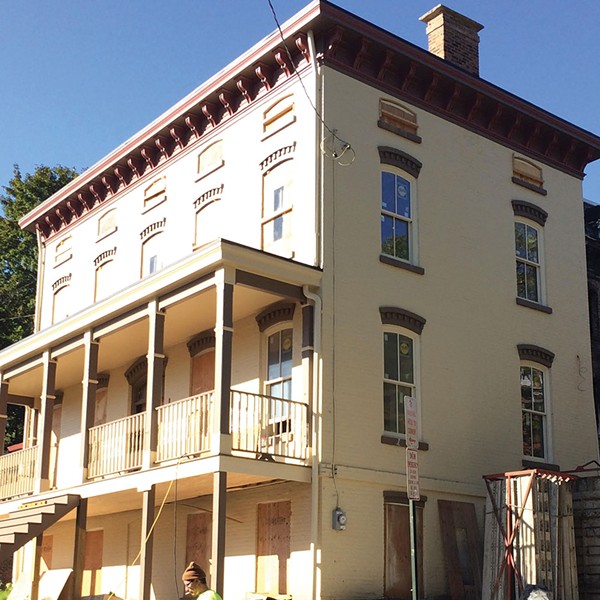| "Big Frank" and his dog, Midnight, at their northern Ulster County camp. |
GOING IT ALONE
Rather than struggle with rent without assistance, or in some cases, adhere to social services requirements or treatment programs, some people opt out altogether. Barbara McClinton says there are more outsiders than most people realize. "There's a lot of them - I deal with a gentleman who's disabled, on SSI, who lives in his car, and takes showers at his sister's. Another one lives under the steps at the Broadmoor, [an old hotel on Broadway in Kingston] and sits out there every day with his bags. The kids like the campgrounds, like along the creek on River Road in Rosendale, or on Creek Locks Road, a lot of them camp out there and they fish to eat. When you tell people they look at you like, 'Huh? We have homeless people here?'"
In the woods behind a store in northern Ulster County a camp has been set up by both kids and adults. "Big Frank," 40, lives there with Midnight, his Black Labrador-Rottweiller mix, and several skateboarding "gutter punks," as he calls them. Big Frank grew up in Orange County and occasionally visits family there, but he prefers to be on his own. He gets by on payments for odd jobs and landscaping work rather than get a regular job, receive Social Services, or "pay $600 or $700 or $800 for an apartment, or even $400 or $500 for some dintzy little room with a shared bathroom." Although he has applied for emergency and temporary housing as well as Social Services benefits, Big Frank believes he isn't cut out to be helped. "Shelters wouldn't help me, they kept on turning me down, and I didn't like it," he says. "I had an attitude about it, which they couldn't understand, of course." Nor is he capable of sticking to drug therapy. "I don't want to attend, I don't want to have to do what someone else says," he explains. "I'm better off in nature. Nature helps me."
Big Frank's makeshift campsite isn't the only one in the woods, but it's the largest, and the neatest, complete with a campfire circle, Coleman stove, seating area made of logs, clothes hanging to dry on the branches of surrounding trees, and the beginnings of the hut he is building to house him through next winter and beyond. He's done it before, and stayed warm, even before he got Midnight as a puppy last year to sleep on his chest at night. "I can build all kinds of huts," he says proudly. He's already begun collecting metal cans to weld together to make a woodstove and chimney. "I buy what I need when I do the work to get it."
Big Frank has been in and out of jail all his life, mostly for burglary, has a history of substance abuse, and spent 13 years as a skinhead. Between jail sentences, he's lived in cardboard boxes in New York City and in urban areas all over the Hudson Valley. Last spring he hitchhiked to the Woodstock area from Poughkeepsie because he "got tired of the Bloods [gang members] shooting at me, and it was time to get out, be on my own, and keep my nose clean."
Big Frank says that being in nature helps him stay off drugs, and it allows him to form relationships with other people. Although he arrived with nothing but a backpack, he says he's bought or been given everything he needs. "I'm amazed at people's generosity," he says. Although his neighbors know where he is, he says the police don't approach him unless he turns his music up too loud. At night Big Frank often visits the local Cumberland Farms where, sometimes, he asks customers for money.
| Section 8 recipient Maureen Reilly in her New Paltz apartment. |
SECTION 8
"I can't tell you how many times landlords have shut doors in my face," says Maureen Reilly. Reilly, 46, is disabled, and receives SSI. Thanks to Section 8, she says, she is able to maintain a sense of dignity she would not have otherwise. A resident of New Paltz since 1971, Reilly rented a single room, sharing a bathroom and cooking on a hot plate, for 17 years. Although she never wanted to apply for Section 8, believing there were people more needy than herself, friends finally convinced her to get on the waiting list. In 1996, her name came up, and Reilly finally found a one-bedroom apartment and a landlord who was willing to take her on as a tenant "because he wanted to do some good, to help somebody," she says. "When I met him, I was so surprised I started to cry, I couldn't believe it. Another landlord had told me, 'All you people who receive government checks are all the same - you're drunks and drug addicts, and you have too many babies.'"
















